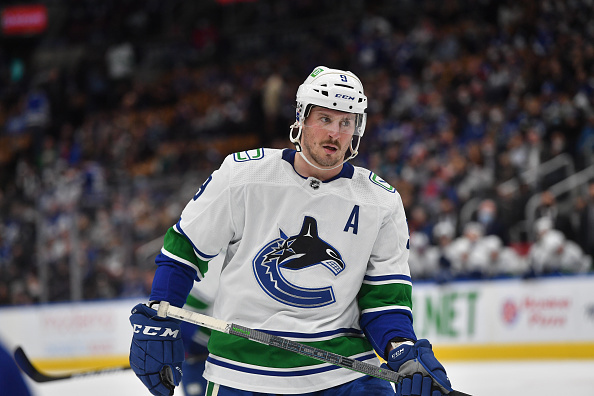Stars let organizations win games; teams let organizations win the Stanley Cup. NHL trades, ideally, do both.
How to Win a Stanley Cup:
Step One: Have the best team. Step Two: Win 16 playoff games in one season. And of course, Step Three: Profit!
NHL Trades Leading to Success
A Brief Digression
In the 19th century, Scottish philosopher Thomas Carlyle published On Heroes. In brief, he proposed that individuals were the decisive factor in history due to their outstanding nature. It was hugely influential and changed the Western teaching of history for decades. Which sucked because it’s not a very good means of describing events and a worse one for describing history. Circumstances around the supposed Great are mostly brushed off as “this had to be here for them to emerge!” Basically one half-step above “he must be a leader because he was born to royalty.”
So let’s talk hockey!
Trade Deadline’s A-Comin’!
A very popular statement about NHL trades is that whoever got the best player won the deal. And that’s okay for a quick judgement as long as it’s players moving in both directions. But to leave it at that is to ignore everything else around the teams. For the Vancouver Canucks, the real-world environment has put a wrench into trade plans. If they could find a General Manager who still believed that “best player wins” maxim, it would be fairly easy to trade J.T. Miller. Does the team want five parts for him? A couple of prospects, an NHLer, and a couple of picks? Great! Done!
In the real world, of course, it’s rather more complicated than that. Not only do players, or other assets, need to move, but cap space has to get worked out, a suitable return organized, and the receiving team has to consider how valuable the long-term losses are. As an example, one of the more popular trade possibilities floated out there involved the New Jersey Devils. Some variant of Pavel Zacha, Ty Smith, and picks going to Vancouver in return for Miller.
There are problems with this deal, of course, including that Miller will be an unrestricted free agent by the time the Devils reach the playoffs. That’s a lot of the value in trading for him now instead of the off-season. Yes, Miller is clearly the best player in that trade, but he’s not going to fit into the timeline New Jersey has. And that is the sort of package that the Canucks need to move him. Vancouver has a lot of needs, and if they trade away their highest scorer, they’ll have another.
[pickup_prop id=”9781″]
One Vs 100
Right now, in fact, Miller may well have performed his way off the market. Since returning from the All-Star break, he has points in 10 of 11 games. That’s seven goals and 19 points in 11 total games. He has three eight-game scoring streaks this season. The Canucks, in turn, are 8-3 in those same games. If they are going to move him, it will be one of the biggest NHL trades in recent years. Any trade involving him means the best player in the deal is leaving the team. There is literally nothing else that’s an option right now.
There’s a good reason for that – teams can’t win with one player, and those in position to win have most of their pieces already. Miller would be an excellent addition for any team, but anyone picking him up now can’t afford much. Or, more precisely, can’t afford much in the way of current skill. So everything the Canucks can get will be in the way of potential. But that can still work. Indeed, it has to if they want to avoid the wrath of their fans. Fans of every team remember bad NHL trades far longer than they remember good ones.
Add in just how hard it is to win the Stanley Cup, and even teams that should go all-in will hesitate. Contending teams know this and aren’t going to take talent off their roster, even if it’s “depth” pieces. That depth is going to be needed eventually in the second season. Facing one team in a series is vastly different than once a month. Coaches prepare to face stars. A one-line team in that situation is doomed.
Tanks for No Memories
So-called “tanking” a season is a way to get the best possible player. This could be deliberately keeping talented prospects off the team for a while, for instance, or taking on bad contracts in trade for picks. The problem here is that one player, no matter how talented, isn’t going to be enough. It never is. The last team to win with their first overall pick was the Tampa Bay Lightning. Their first overall pick was Steven Stamkos and that took 12 seasons. The Chicago Blackhawks had a much quicker turnaround with Patrick Kane preceding their Stanley Cup win by just three seasons.
But the Blackhawks got lucky, winning the draft lottery and moving up from fifth overall to first. And make no mistake, Kane was an essential part of the Cup-winning team! But the leading goal-scorers for that run were Patrick Sharp and Dustin Byfuglien. Asking one player to get 16 wins against four different teams is ridiculous. They need team support. The best skaters in the league aren’t on the ice for even half the game.
Teams, as the late Jason Botchford put it, need an army. They need a pile of prospects who might not become stars but can be NHL regulars. The stars they do have – acquired by whatever means – need a solid team to elevate. Rockets need a launchpad, not mud.
How to Win a Stanley Cup
By winning. No one can really tell you how because there are far too many variables in every direction. Factors that also include blind luck. Excellent teams have been jammed in the first round. Mediocre ones have made the final. But the best chance you can have to win the Cup is to build the deepest team. And in the NHL trades are a huge part of that. Depth wins championships, even if it includes moving out the best player in a deal to get it.
Main Photo:






